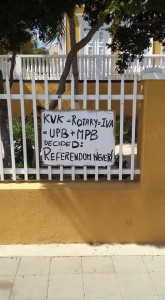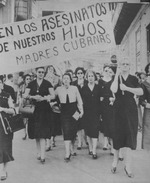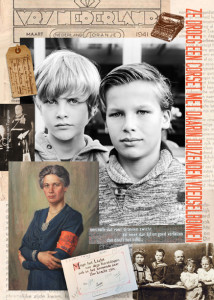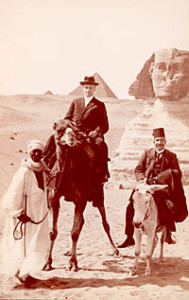dLOC ~ Digital Library Of The Caribbean
The Digital Library of the Caribbean (dLOC) is a cooperative digital library for resources from and about the Caribbean and circum-Caribbean. dLOC provides access to digitized versions of Caribbean cultural, historical and research materials currently held in archives, libraries, and private collections.
Read the dLOC Fact Sheet (and more about dLOC), see the dLOC partners, read about dLOC’s Protecting Haitian Patrimony Initiative, or Register for a free mydLOC user account. Please contact us with any questions.
dLOC is developing a collaborative funding model. Support dLOC financially by becoming an institutional member or a personal member.
Go to: http://www.dloc.com/
Het verhaal is nooit af… ~ Een korset met duizenden voedselbonnen
“Het is best heftig wat zich allemaal in mijn familie heeft afgespeeld. Mijn opa is Paul van Tongeren. Zijn vader Hermannus van Tongeren jr werd in 1944 met een nekschot doodgeschoten door de Duitsers vanwege zijn verzetswerk. Mijn opa is als tweejarige zijn vader kwijtgeraakt en zijn moeder was zo in shock dat ze niet meer heeft gesproken. Dat vind ik een heel naar verhaal”, vertelt de 12- jarige Sies van Tongeren in het Groningse Haren. Zijn broertje Mart (8 jaar) zit bij het gesprek.
De zuster van hun overgrootvader was Jacoba van Tongeren. Zij was zesendertig jaar toen de oorlog uitbrak en rolde via haar vader, Hermannus van Tongeren sr, generaal en grootmeester in de Orde der Vrijmetselaren, meteen het verzet in. Als oud-militair bracht hij haar militaire beginselen van geheimhouding bij. “Ze is door hem als een jongen opgevoed. Ze heeft als klein kind met hem in de bushbush gewoond in Nederlands-Indië, omdat haar moeder haar niet als kind wilde. Jacoba is waarschijnlijk de enige vrouw die tijdens de Tweede Wereldoorlog een grote verzetsgroep heeft geleid, Groep 2000. Ze was door haar vader getraind om sterk te zijn. Sommige mensen vonden het raar dat een vrouw leidster was van een groep. Maar ik beschouw haar als een stoere vrouw. Ze dacht aan anderen. Dat vind ik bijzonder.”
“Ze droeg een korset met daarin duizenden voedselbonnen. Ze deed net alsof ze zwanger was. De Duitsers stonden voor haar op.”
Groep 2000 werkte met een code die Jacoba van Tongeren had bedacht met het oog op veiligheid. Alle groepsleden, maar ook de vele onderduikers die zij ondersteunde, werden niet met hun eigen naam genoemd maar met een cijfercode. Ook het adres was gecodeerd. Alleen met een sleutel kon je de codes ontcijferen. Uiteindelijk liep het toch mis. Op vrijdag 9 maart 1945 werd het hoofdkantoor van Groep 2000 aan de Stadhouderskade 56 door de Duitsers bezet. Alhoewel Jacoba strikte orders had gegeven dat als er niet op kantoor werd gewerkt, de codesleutel meegenomen moest worden, bevond die zich toch nog op de Stadhouderskade toen de Duitsers er die vrijdagavond binnenvielen. Read more
Nikolaos Karagiannis & C.J. Polychroniou ~ The Scourge Of Dependency And Globalization In The Caribbean
 truth-out.org. April 2015. Historically, the Caribbean countries developed under the tutelage of different European empires, and more recently under North American dominance. As a result, the Caribbean came to be a classic area of plantation society as there is a certain unity to the region’s development and in its patterns of historical evolution. Furthermore, the plantation economy models emphasized the historical continuity of Caribbean dependence from the slave plantation to modification following emancipation, to further modification in the post-colonial era. Political independence established national sovereignty (i.e., “flag independence”) in older and newer nations of the Commonwealth Caribbean, when both groups were integrated into the international system. Consequently, the political process of national independence converted states, societies and nations that had evolved as integral parts of the global system. The effect was to legitimize their autonomy based on concepts of self-determination.
truth-out.org. April 2015. Historically, the Caribbean countries developed under the tutelage of different European empires, and more recently under North American dominance. As a result, the Caribbean came to be a classic area of plantation society as there is a certain unity to the region’s development and in its patterns of historical evolution. Furthermore, the plantation economy models emphasized the historical continuity of Caribbean dependence from the slave plantation to modification following emancipation, to further modification in the post-colonial era. Political independence established national sovereignty (i.e., “flag independence”) in older and newer nations of the Commonwealth Caribbean, when both groups were integrated into the international system. Consequently, the political process of national independence converted states, societies and nations that had evolved as integral parts of the global system. The effect was to legitimize their autonomy based on concepts of self-determination.
Read more: http://www.truth-out.org/the-scourge-of-dependency
Basic Income Earth Network (BIEN)
 Founded in 1986, the Basic Income European Network (BIEN) aims to serve as a link between individuals and groups committed to, or interested in, basic income, i.e. an income unconditionally granted to all on an individual basis, without means test or work requirement, and to foster informed discussion on this topic throughout Europe.
Founded in 1986, the Basic Income European Network (BIEN) aims to serve as a link between individuals and groups committed to, or interested in, basic income, i.e. an income unconditionally granted to all on an individual basis, without means test or work requirement, and to foster informed discussion on this topic throughout Europe.
Members of BIEN include academics, students and social policy practitioners as well as people actively engaged in political, social and religious organisations. They vary in terms of disciplinary backgrounds and political affiliations no less than in terms of age and citizenship. In the course of two decades, “BIEN” has become somewhat of a misnomer, as scholars and activists from other continents have actively joined the network.
Common to all is the belief that some sort of economic right based upon citizenship – rather than upon one’s relationship to the production process or one’s family status – is called for as part of the just solution to social problems in advanced societies. Basic Income, conceived as a universal and unconditional, if modest, continuous stream of income granted throughout life to all members of a political community is just the simplest and most striking element in an expanding set of social policy proposals inspired by this belief and currently debated, if not already implemented.
To actively foster this debate, BIEN publishes a newsletter which provides an up-to-date and comprehensive international overview on relevant events and publications. It organises bi-annual BIEN-congresses where people from more than twenty countries have met to report and discuss basic income and related proposals in connection with a broad spectrum of themes, such as unemployment, European integration, poverty, development, changing patterns of work career and family life, and principles of social justice.
BIEN expanded its scope from European to the Earth in 2004. It is an international network that serves as a link between individuals and groups committed to or interested in basic income, and fosters informed discussion of the topic throughout the world.
Go to: http://www.basicincome.org/
National Anthropological Archives
The National Anthropological Archives and Human Studies Film Archives collect and preserve historical and contemporary anthropological materials that document the world’s cultures and the history of anthropology. Their collections represent the four fields of anthropology – ethnology, linguistics, archaeology, and physical anthropology – and include fieldnotes, journals, manuscripts, correspondence, photographs, maps, sound recordings, film and video created by Smithsonian anthropologists and other preeminent scholars.
The collections include the Smithsonian’s earliest attempts to document North American Indian cultures (begun in 1846 under Secretary Joseph Henry) and the research reports and records of the Bureau of American Ethnology (1879-1964), the U.S. National Museum’s Divisions of Ethnology and Physical Anthropology, and the River Basin Surveys. The NAA also maintains the records of the Smithsonian’s Department of Anthropology and of 25 professional organizations, including the American Anthropological Association, the American Association of Physical Anthropologists, the American Ethnological Society, and the Society for American Archaeology.
Enjoy: http://www.anthropology.si.edu/
Zeynep Tufekci ~ How The Internet Has Made Social Change Easy To Organize, Hard To Win
Today the speed at which we spread information is so fast that a single email can launch a worldwide awareness campaign, as with the Occupy movement. Yet as techno-sociologist Zeynep Tufekci seeks to show, the ease of social media can actually hurt social change in the long run. From Gezi to the Arab Spring to Ukraine to Hong Kong, she shows how today’s movements can miss out on the benefits of doing things the hard (and slow) way.
TEDTalks is a daily video podcast of the best talks and performances from the TED Conference, where the world’s leading thinkers and doers give the talk of their lives in 18 minutes (or less). Look for talks on Technology, Entertainment and Design — plus science, business, global issues, the arts and much more.
Find closed captions and translated subtitles in many languages at http://www.ted.com/talks/zeynep_tufek…
Follow TED news on Twitter: http://www.twitter.com/tednews
Like TED on Facebook: https://www.facebook.com/TED
Subscribe to our channel: https://www.youtube.com/user/TEDtalksDirector
Read more: Zeynep Tufekci – Social Movements and Governments in the Digital Age: Evaluating a Complex Landscape





